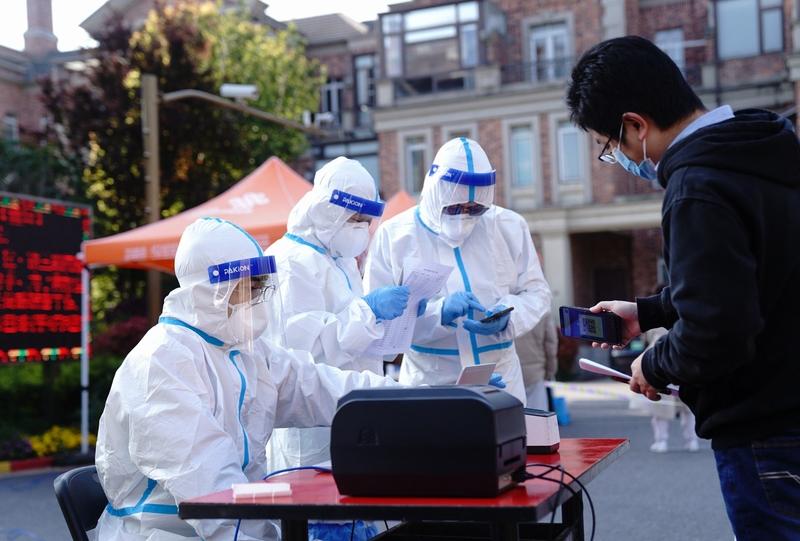 Volunteers help a resident register for nucleic acid test at a community in Songjiang district of Shanghai, April 4, 2022. (PHOTO / XINHUA)
Volunteers help a resident register for nucleic acid test at a community in Songjiang district of Shanghai, April 4, 2022. (PHOTO / XINHUA)
The fight against the latest wave of the novel coronavirus has entered a critical stage in Shanghai, where public health workers finished collecting samples for nucleic acid testing from all the city's more than 25 million residents on Monday.
The city reported a record 13,086 new asymptomatic coronavirus cases on Monday, up from 8,581 the previous day, although symptomatic cases fell to 268 from 425 a day earlier, according to the National Health Commission's daily pandemic report on Tuesday. That the city has reported over 73,000 cases since March points to the urgency for Shanghai to take "resolute and swift moves" to stem the spread of the virus citywide in the shortest time possible, as Vice-Premier Sun Chunlan urged on Monday during her inspection of nucleic acid testing sites, sealed residential areas, centralized quarantine sites and the municipal big data center.
The results of Monday's nucleic acid test will show the effectiveness of the measures taken in the past week and an assessment of the pandemic situation will be carried out to determine what steps the city needs to take next.
Such a huge amount of work could not have been completed without the timely support provided by other parts of the country, which testifies to the systemic advantage of the country. Around 38,000 personnel have so far been deployed to Shanghai from other regions in what is the biggest nationwide medical operation since the shutdown of Wuhan in early 2020. More human and material resources are on the way.
But as well as medical resources the fight against the virus must be people-centered, as it cannot be won without the support and cooperation of local residents and grassroots communities and public health workers. So, while implementing prevention and control measures, officials must try to ensure "minimum costs" to daily life and economic activities, and make sure that people's livelihoods and their interests are given top priority. It is encouraging that temporary vegetable warehouses have been built in Shanghai to ensure supplies, and that tax refunds, cuts in rent and low-cost loans have been announced to help small businesses tide over the difficulties.
For Shanghai to contain the spread of the virus and resume normal economic activities as soon as possible carries much significance for China's economy and even the global supply chains, given the city's position as the country's largest manufacturing, shipping and financial hub. Major manufacturers including multinationals such as General Motors and Volkswagen are still operating with a "closed loop" strategy that isolates employees, and the local port authorities said the Shanghai port is still running normally without reports of congestion of container ships, highlighting that economic operations have not been completely suspended in the city.
That the epidemic in Shenzhen can be effectively controlled should serve to consolidate confidence that Shanghai can do the same with national support.


